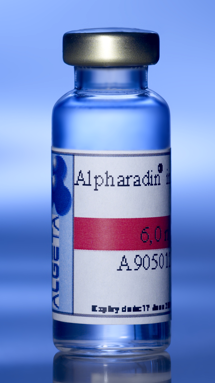
An investigational radiopharmaceutical has been found to improve survival in patients with advanced prostate cancer in a phase 3 study that is still ongoing. Only 4 other products have managed to show such a survival benefit.
The result emerged during an interim analysis of the Alpharadin in Symptomatic Hormone-Refractory Prostate Cancer (ALSYMPCA) trial, which is investigating the novel alpha particle-emitting product radium-233 chloride (Alpharadin). This trial enrolled 922 patients with castration-resistant prostate cancer and symptomatic bone metastases, allocated 2:1 to drug:placebo, both administered intravenously at intervals of 4 weeks, for 6 sessions.
The interim analysis found a statistically significant improvement in survival in patients receiving Alpharadin of 14 months compared with 11.2 months in those receiving placebo (P =.0022; hazard ratio, 0.699). The Independent Data Monitoring Committee called for the trial to be stopped, and all patients receiving placebo were offered the active drug. These top-line results were released by the company in a press release earlier this year, and there is anticipation among the oncology community that they will be presented in full at the forthcoming European Cancer Organisation/European Society for Medical Oncology annual meeting in Stockholm, Sweden, in September 2011.
Radium-223 chloride is now under development by Bayer, which licensed it in from the Norwegian company Algeta ASA in September 2009. The company just announced that the product has been given a US Food and Drug Administration Fast Track designation, which expedites the review of drugs that are aimed at serious diseases and that fill an unmet medical need.
The survival result in the interim analysis was highlighted by Chris Parker, MD, from the Royal Marsden Hospital, Sutton, United Kingdom, and Oliver Sartor, MD, from Tulane Cancer Center, New Orleans, Louisiana, in a letter appearing in this week's edition of the New England Journal of Medicine.
They write: "Radium-223 is a novel alpha-pharmaceutical that specifically targets bone metastases and has shown excellent efficacy and safety in a randomised phase 2 trial (Lancet Oncol. 2007;8:587-594)."
The ongoing phase 3 trial, known as ALSYMPCA (NCT00699751), recently had "a positive interim analysis for the overall survival end-point," they note.
"Radium-223 now joins a select list of just 5 drugs that have been shown to improve overall survival in patients with advanced prostate cancer," they add.
For a long time, the only drug with a survival advantage in this setting was docetaxel, but it has recently been joined by 3 new products, all approved in the United States: abiraterone (Zytiga, Cougar Biotechnology), cabazitaxel (Jevtana, Sanofi-Aventis), and the novel prostate cancer vaccine sipuleucel-T (Provenge, Dendreon).
N Engl J Med. 2011;365:766-768.
CORRESPONDENCE
Abiraterone and Increased Survival in Metastatic Prostate Cancer
De Bono et al. (May 26 issue)1 report that the CYP17 inhibitor abiraterone increased survival in patients with metastatic castration-resistant prostate cancer. However, CYP17 inhibition leads to a corticotropin-induced mineralocorticoid excess that needs to be efficiently counteracted.2 In this study, such hormone derangement was mitigated but not abolished by the concomitant administration of prednisone. A greater incidence of hypokalemia and fluid retention was seen in patients receiving abiraterone plus prednisone than in those receiving placebo plus prednisone, and this may have contributed to the greater cardiac toxicity observed. It would be interesting to know how the investigators managed these side effects and the results obtained. In particular, was the prednisone dose increased? Were mineralocorticoid-receptor blockers introduced? Because of its intrinsic mineralocorticoid activity,3 prednisone may be not the best drug to be used in this context, and the potential introduction of dexamethasone as an alternative should be discussed.2 Finally, the authors should discuss the utility of monitoring serum corticotropin levels during abiraterone treatment in order to adjust the supplementation therapy on an individual basis.






 留言列表
留言列表
 線上藥物查詢
線上藥物查詢 